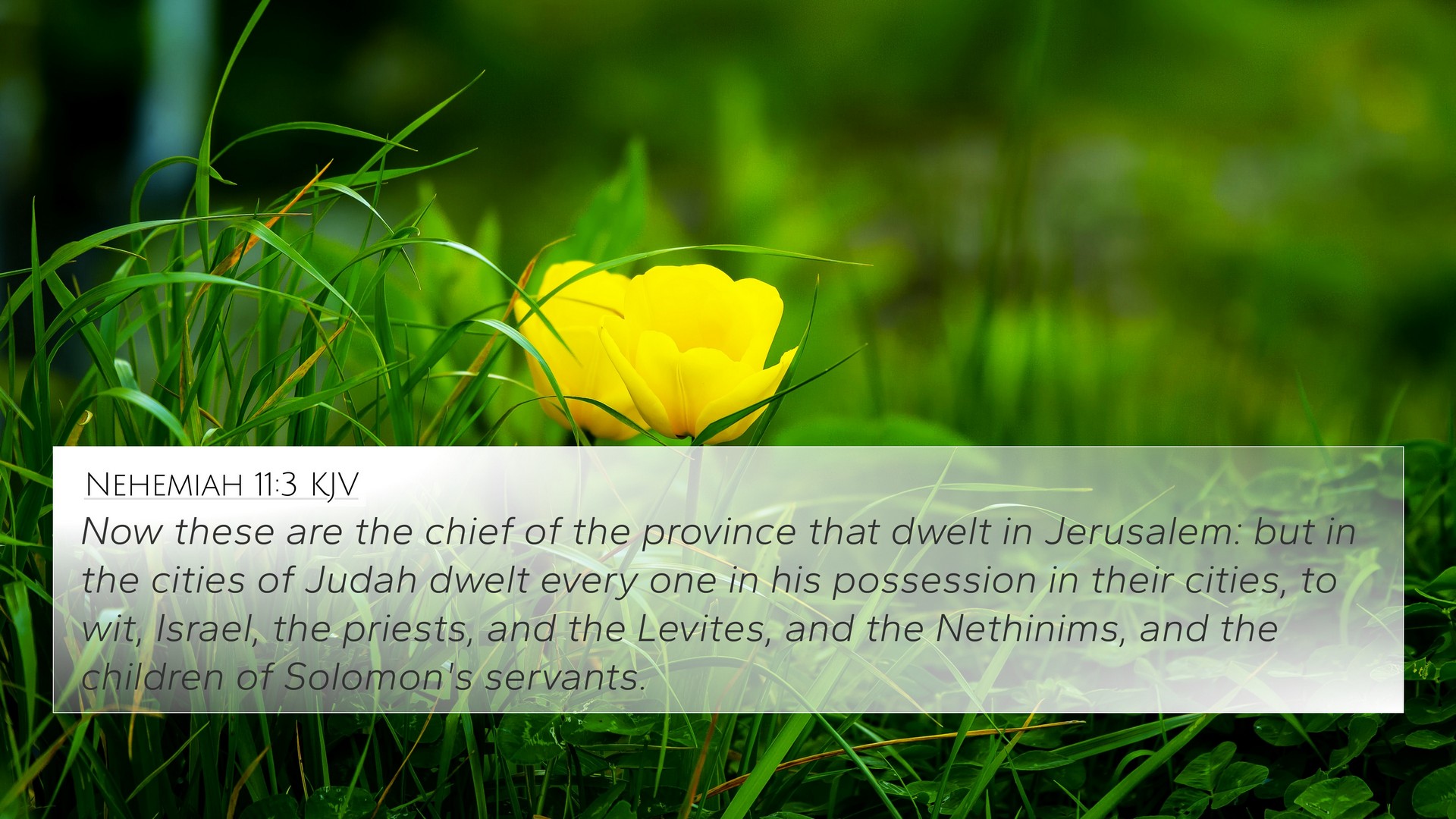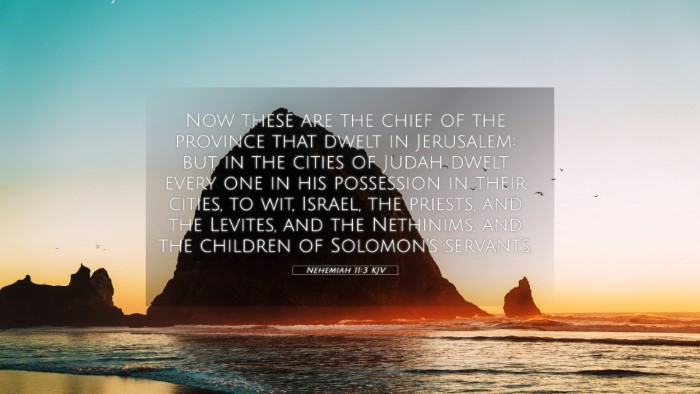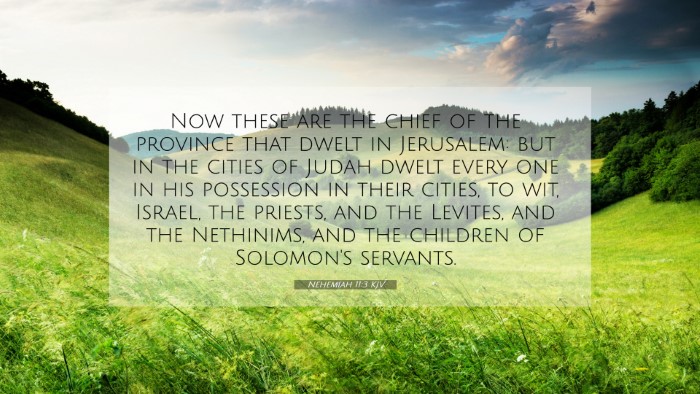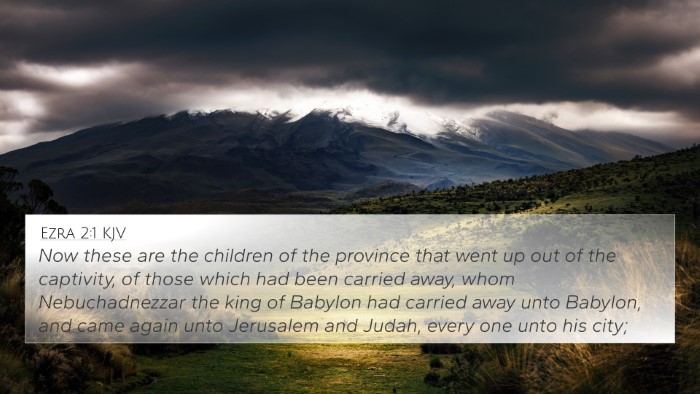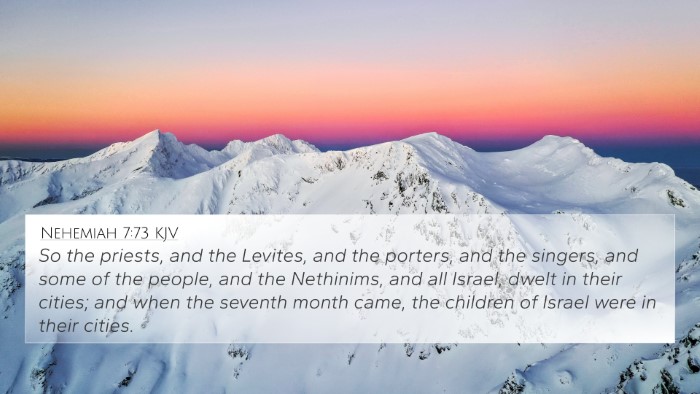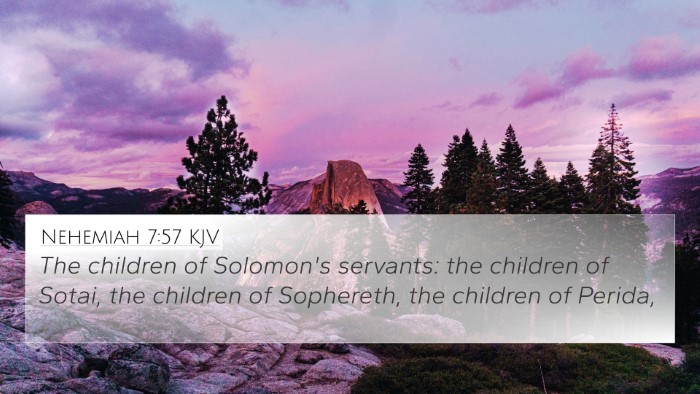Understanding Nehemiah 11:3
Verse: "And these are the chief of the province that dwelt in Jerusalem: but in the cities of Judah dwelt every one in his possession in their cities, to wit, Israel, the priests, and the Levites, and the Nethinims, and the children of Solomon’s servants."
Summary of Commentary Insights
The verse Nehemiah 11:3 highlights the organization of the people who returned to Jerusalem after the Babylonian exile. It emphasizes the role of various groups, such as the priests, Levites, and others, in the re-establishment of Jerusalem as a center of worship and community.
This verse is crucial as it illustrates the rebuilding process not just of the physical city but also of its societal and religious structure. Recognizing the people who settled in Jerusalem shows God's providence and the fulfillment of His promise to restore His people.
Key Themes and Meanings
- Divine Restoration: The gathering of the exiles signifies God's faithfulness in restoring His people to their homeland.
- Community and Identity: Each group mentioned holds a specific role, which reflects the importance of community and identity within the Jewish faith.
- Leadership and Responsibility: The "chief of the province" highlights leadership roles that were essential in the management and organization of the post-exilic community.
- Faithfulness in Rebuilding: The verse underscores the efforts of those willing to return and settle, which demonstrates faithfulness to God's calling.
- Connection to Previous Scriptures: This verse connects to various other scriptures where God commands His people to return and rebuild, showcasing the consistent theme of restoration throughout the Bible.
Bible Verse Cross-References
- Ezra 2:1-2: The list of families returning to Jerusalem serves as a foundation for understanding who made up the new community.
- Neh. 7:6-7: This section also lists the Israelite families that returned to Jerusalem, underpinning the community's roots.
- Jeremiah 30:18-19: A prophecy of restoration that correlates with the rebuilding of Jerusalem and the return of God's people.
- Isaiah 44:26: This verse speaks about God fulfilling His words, which relates to the promise of return and restoration seen in Nehemiah.
- Ezekiel 36:8-11: God's promise to plant His people in their land again, resonating with Nehemiah's account of those who returned.
- Psalm 126:1-3: A song of ascent, expressing joy in return like those who returned to Zion in Nehemiah's time.
- Matthew 5:14: Referring to being a city set on a hill, this can be seen as a calling for those in Jerusalem to reflect God’s glory.
- Acts 15:16: James references the rebuilding of the fallen tent of David, which echoes the restoration theme in Nehemiah.
- Hebrews 11:10: Reference to the city which has foundations, connecting the faith of the people with the enduring promise of God.
- Revelation 21:2: The new Jerusalem coming down from heaven, highlighting the ultimate fulfillment of God's promise to restore His people fully.
Applications for Thematic Bible Verse Connections
Understanding Nehemiah 11:3 in the context of these cross-references allows for a deeper appreciation of the themes of restoration, community, and God's enduring promises. By linking these scriptures, one can see the larger picture of God's plan across both the Old and New Testaments.
Tools for Bible Cross-Referencing
- Use a Bible concordance to find words and their occurrences throughout the scriptures.
- Access a Bible cross-reference guide for connecting verses by themes or topics.
- Utilize Bible reference resources to explore the context of each verse further.
- Implement cross-reference Bible study methods during personal or group study sessions.
- Engage with detailed cross-references in commentaries highlighting connections within the scriptures.
Inter-Biblical Dialogue
The dialogue between various books of the Bible is enriched when one examines verses such as Nehemiah 11:3. It serves as an essential building block, inviting readers to explore how God's restoration of Jerusalem parallels His work throughout history and into the future.
In conclusion, Nehemiah 11:3 is more than a historical note; it is a testament to God's continual calling for His people to return, rebuild, and reflect His glory. The numerous scripture cross-references offer further insights and encourage readers to seek deeper connections within the sacred text.
